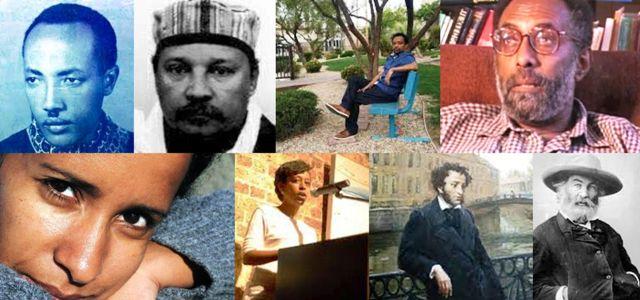
Some Of The Best Ethiopian Poems and Poets
Ethiopian poetry comprises of one of the many unique and amazing secrets held dearly by the people of Ethiopia.We are all aware of how little is known by non-Ethiopians about the countless rich and varied aspects of Ethiopian life.
What's known is mostly acquired from scant and fragmented media reports about famine, poverty, social unrest, and so on.
But this has only painted a weak representation, which falls far short of portraying a fascinating people, their country, and their history in their true likeness.
The following poems of Ethiopia provide a small glimpse of an aspect of Ethiopian life that has had little, if any, external exposure.
Amharic poetry could prove to be a modest but laudable contributor towards enlightening the masses.
It is almost impossible to get the proper translation of the many Ethiopian poems composed throughout the country's long and culturally rich history.
Qene, is a highly regarded form of Amharic poetry, although the word is also used as a general term to describe all poetry.
True Qene uses double meanings of Amharic words and metaphors to provide one with two entirely different views of the subject.
The first one is the obvious and easily comprehended meaning, while the second is hidden from the reader/listener, who has to go through the process of uncovering its mysterious subtext.
These two meanings are commonly known as wax and gold or "sem ena work", with the obvious one being wax, while the hidden is gold.
Qene is utilized in a variety of ways and circumstances, from secretly criticizing someone while appearing to make a simple joke to expressing one's love to another while insulting them.
This makes translating them extremely difficult, but all said and done, there are many magnificent poems about Ethiopia that have been translated satisfactorily.
Themes ranging from African identity crisis, nature, problems facing educated individuals, the fate of the present generation, social criticism, and more, are recurrent in these poems.
The following are 25 poems by Ethiopian poets and foreigners with the subject generally being about Ethiopians and Ethiopia.
1. Tsegaye Gebre-Medhin: Nile
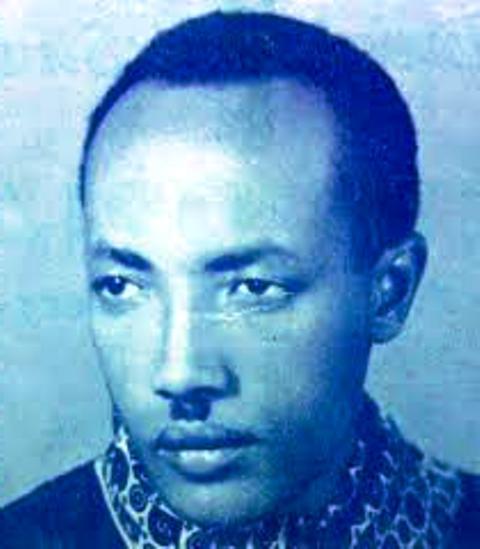
Tsegaye Gebre-Medhin, a poet, playwright, translator, essayist, and art director was also Poet Laureate of Ethiopia and elected to the United Poets Laureate International.
Nile
I am the first Earth Mother of all fertility.
I am the Source, I am the Nile, I am the African, I am the beginning!
O Arabia, how could you so conveniently have forgotten,
while your breath still hangs upon the threads of my springs?
O Egypt, you prodigal daughter born from my first love,
I am your Queen of the endless fresh waters,
who rested my head upon the arms of Narmer Ka Menes
when we joined in one our Upper and Lower Lands to create you!
O Sudan, born out of the bosom of my being,
how could you so conveniently count down
in miserable billions of petty cubic yards
the eternal drops of my life-giving Nile to you?
Beginning long before the earth fell from the eye-ball of heaven,
O Nile, that gushes out from my breath of life
upon the throats of the billions of the Earth's thirsty multitudes,
O World, how could you so conveniently have forgotten
that I, your first fountain, I your ever Ethiopia
I your first life still survive for you?
I rise like the sun from the deepest core of the globe.
I am the conquoror of scorching pestilences.
I am the Ethiopia that "stretches her hands in supplication to God".
I am the mother of the tallest traveller on the longest journey on Earth!
My name is Africa, I am the mother of the Nile.
O Nile, my prodigal daughter in the wilderness of the desert,
bringing God's harmony to all brothers and sisters
and calming down their noises of brass in their endless nakednesses,
O Nile, you are music that restores the rhythm of existence
into the awkward stampeding of these Middle Eastern blindnesses,
you are the irrigator that cultivates peace
from my Ethiopian sacred mountains of the sun,
across to nod on the East of Aden and across Sinai,
beyond Gibraltar into the heights of Mount Moriah,
O Nile, my chosen sacrifice for a universal peace offering
upon whose gift the heritages of Meroe and Egypt
still survive for the benefit of our lone World.
You are the proud daughter, O Nile, who taught
the ancient world how to walk in upright grace!
You are my prodigal daughter who saved and breast-fed
little lost Jacob whose brothers sold for food,
you, who nurtured, fed and raised
the child prophet called Moses on your cradle,
you, who stretched out your helping hand and protected
the baby Christ from the slaughtering swords of Herod,
O Nile, my infinite prodigal daughter
at whose feet mountains like Alexander bent
their unbendable heads to drink from your life-giving milk,
O Nile, at whose feet giants like Caesar knelt,
conquerors like Napolean bowed
their unbowable heads to partake from your imortal bounty.
O Nile, you are the majestic blood line of my African glory
that showers my blessings upon the starved of the world,
you are the eloquence that rings the Ethiopian bell across the deaf world!
You are the gifted dancer of graceful rhythms
that harmonize with your sisters Etbara and Shabale,
with your brothers Awash and Juba,
to fertilize the scorched sands of Arabia.
O Nile, without your gift Mediterranean shall be a rock of dead waters
and Sahara shall be a basket of skeletons!
You are Africa's black soil that produces life.
You are the milk that quenches the thirsty multitudes.
You are the messenger of my gospel, O Nile,
that brings my abundant harvest to the mouth of the needy.
You are the elegant pilgrim of my mercy.
You are the first fountain, you are the first ever Ethiopia.
You are the appeaser of the lustful greeds.
You are the first Earth Mother of all fertility,
Rising like the sun from the deepest core of the globe.
You are the conqueror of the scorching pestilence.
You are the source, the Africa, the Ethiopia, you are the Nile.
*Note: Written in English, August 1997
2. Solomon Deressa: Poem to the Matrix
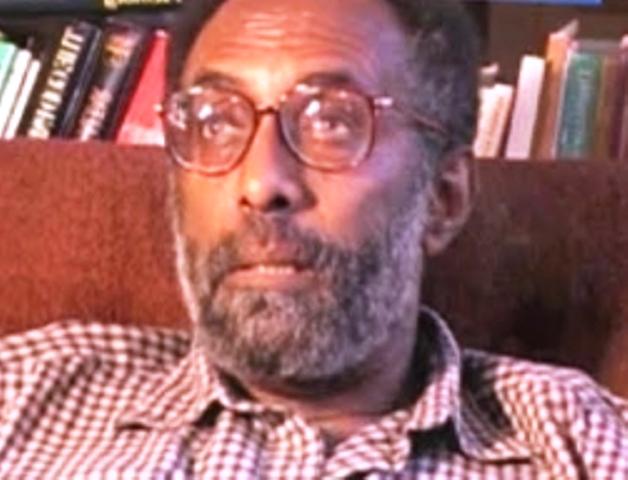
Solomon Deressa was born in the western part of Ethiopia and is an essayist, poet, and screenwriter. "L'jnnet" or Youth was his first book of poems and it was said to have been a turning point for modern Ethiopian poetry.
Poem to the Matrix
image and syllable part like the Eritrean Sea
Somalia disintegrates at the tight end of unity
highlanders, eyes shut, chase a cat's-tail atonement
dreamer and dream now live and die lives apart
Sabean images gone, the syllabary stays behind
going this way, then that, before deciding on left to right...
leeching first on prophetic sleight-o'hand then on parting waves
then on redemption, here as elsewhere, shorn of compassion
arcane allusions separate lofty brow from dancing feet
in-bred decorum licks the door to primal mystery -----
only the occasional song leaks between door and wall
to repeat what we've heard thrice before
the poem, rebus, sound, vow to the para-verbal
speech rooted in wombs adjacent to the Seat of Power
the Egzi-O, the Ill-la-Hu, the Wy...Wy...Wy, the Ouh...Ouh...Ouh,
the Om Ah Om
repeatedly re-incarnates. Or is not born at all
the Seat of Power, ever present at the play of light and
shade, crumbles where table, picture, printer, petals, lips or cheeks intrude,
& lovely time rides in on a whiff of baking bread, the softness of skin
And the sweetness of breath. Ah! how separation harbours yearning...
love, the first begotten of pulsating light tells a harsh story
(Lucifer's?)
tells of separation and infinite yearning, turns being into cadence...
in anxious confinement apes masturbate against panic (improper)
with order abstraction, we side-step the moment (immoral)
& rhythm becomes time...and matter moves...streaming
& speech reaches to image beyond expedient abstraction...(a poem?)
we, who have been fragmented by serif and sound-bite
who've covered our tracks back to the silence before the first scream
whose tongues can no more move the weight of jaded words
wait, though no one knows we are waiting (why?)
frittered sounds of Oromo, Amharic, Tigrinya, Somali
and the fourty-four fourty-four other tongues...(wherefore?)
how long pretend that life and death did not trade places
& this, the redemptive crucible and not the crotch-point of choices?
store the scream of fourty-four tongues tearing? (how?)
mind your syllables! my shattering is organic, marrow deep...
lie with me in pieces or do not speak at all
replicate the howl of the torture dungeon or say no more (poem?)
the learned barely glimpse their own noses
burnt-face Marxists have proved that, if proof there need be
extrapolating the future out of a past not worth the inventing
as if the past can be counted upon to count!
the past is merely the present limping (did I say that?)
(it takes more than good-will to walk backward straight)
The past has no dimensions, the past cannot see, cannot hear
barely be seen, barely heard - and heard to grant what we already have
later is now unlived, half-arse fantasized, a shadowless dark-alley trick...
(would you hire the dead & the unbegotten even as boundary markers
time's territorial response to panic, a dog's scattered piss
presence cat-napping and coming-to in fits and starts?)
why else would tectonic plates collide, stars implode (panic?)
and the acorn leave eternal encapsulation to stand millennia at best
(talkf of perverse ego!) and the bitch carry a yelping litter to term
when mother and pup will turn to everywhich master for love?
so the epistasis begins at the still point
and spreads in swells as the heart sinks:
beaches, Goddesses and Gods, disoriented whales,
kings and queens, priests and priestesses, all manner of demons,
dictators and controllers and toe-suckers and rulers
and attendants to their divinities and majesties and sanctities
for like the pup they insist they be attended to...
holy shit! all this radiance, all this horror, out of panic!
et la gloire de dieu n'aura pas lieu
just like you
I too am born of this...like you the shattered star
like the tectonic itch inching toward the rapture in the colossal rub
one pup in a litter burning with the ardour of an inflated galaxy...
like you like her like him like it like us like them
in panic I left...and in panic I launch me home
be it no launching be possible for the present be already here
impenetrable to aggression piety, yearning or to seduction...
it is hard core
the saint and the hero are unwelcome here (did I tell you that?)
their ulterior motives are a given
they lack the blinding speed that curls into immobility
the no-mind of the sperm, the ovum's hospitality...
the drying river, the crumbling mountain, the sand that rides the wind
and the twice fourty-four tongues of the Horn do not recognise them...
they speak of ancestral glory, and tomorrow's promise to the millennium
unaware that though they utter every name, there will yet be
unuttered names...
always. And tongues of flame will lick again
words like wet-land weeds will reach for the sun
the young women will smile for no reason at all
and silently ask, how did this all begin?
*Note: This English version by the author first appeared in "Silence is not Golden: A Critical Anthology of Ethiopian Literature", edited by Tadesse Adera and Ali Jimale Ahmed (Red Sea Press, 1995).
3. Kebede Mikael:The Nature of Man
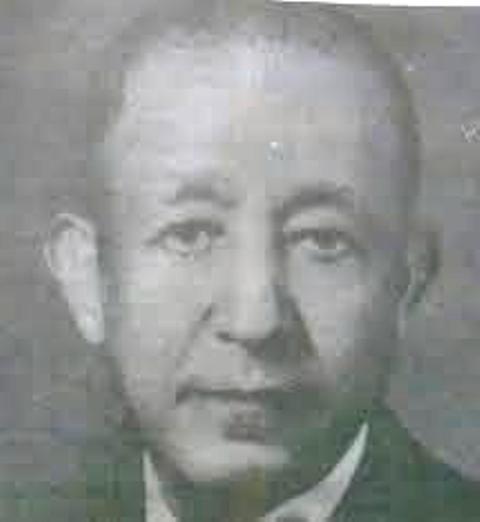
Dr. Kebede Mikael is considered one of Ethiopia's best 20th century authors and thinkers. He wrote a total of twenty-six books, and his many translations from a variety of languages includes Amharic versions of "Romeo and Juliet" and "Macbeth". In 1990, he received an Honorary Doctorate from Addis Ababa University for his unequaled excellence in literature, and for inspiring generations of Ethiopian authors and thinkers.
The Nature of Man
Once upon a time, God ordered all the animals
to gather in a field: all birds and mammals
created from His breath, from mighty strongbones
to the smallest gnat sat down before his throne.
He called Monkey to account: "Look, Monkey,
here are all my creatures from humble Donkey
to the haughty Lion, tell me if you think their beauty
exceeds yours, don't be afraid to speak truthfully,
I will correct whatever you see as your defect."
But Monkey answered like a shot: "Defect?
My face is ruggedly appealing, my chest is manly
and my hands and tail are simply heavenly!
Why should I beg you for a change, when here I stand
on two of the shapeliest legs in the land?
If you are looking for a project, Lord, I'd begin
with Hyena's slanted back, his foolish grin!"
Hyena sidled up to answer the same question.
He simpered that he knew his education
was a little basic but his dusty spots
could tie a young hyeness' heart in knots.
Much better, in his lispy view, to overhaul a beast
like Elephant, whose ears could use a cut and paste
and stick the trimmings to his scrawny tail!
So Elephant appeared to wails
of laughter, everyone expected he would rush
to ask the Lord to wield his broadest brush
and re-invent him. But all he did was praise
our Great Creator for his delicate greys:
"I never saw a single fault in my appearance!
It's Whale who waddles through the sea and flaunts
her shapeless bulk, why not remodel her
and put a stop to all our laughter?"
But Whale was just the same.
Every animal thoroughly enjoyed to name
the flaws in others, to snicker, scoff
and pride themselves as superior stuff.
So God dismissed them all. As I do now,
but I would like to show you how
we can be different: by telling our defects
as humans, examine how imperfect
our paper generosities, lush-sounding words,
when look! we are such small mean lords
pumped up with self-importance,
empty and rude-fingered sycophants!
We humans should tell the Earth and Sky
how cruel we are, but it comes as no surprise
when our strutting tongues collapse
and will not say a word. Our mouth-traps
open for gales of mockery: liars laugh
at blind men, who hear well enough
to snigger at peg-legs, and peg-legs like to jeer
at baldies, baldies at the stutterers who leer
at pompous clerks who themselves ridicule
the hatless customer, and hatless makes a fool
of silly face and silly face laughs at ugly
and ugly mocks a leper for his leprosy -
and who will the leper find to criticise?
oh yes, a cuckold racked with jealousies!
Man, strange being, uncorrectable,
two-faced but strangely simple,
continues his own bad example.
Generations come and go, we stay the same,
like passengers on a commuter train.
We're all alike in this, just different
in superficialities. We were always meant
to give ourselves a long hard stare
and see the library list of imperfections there.
That's why I think it would be so much better,
if we all agreed, not to laugh at each other.
*Note: Translated from Amharic by Chris Beckett, who grew up in Ethiopia
4. Adeleke Adeite: Pride of the Motherland
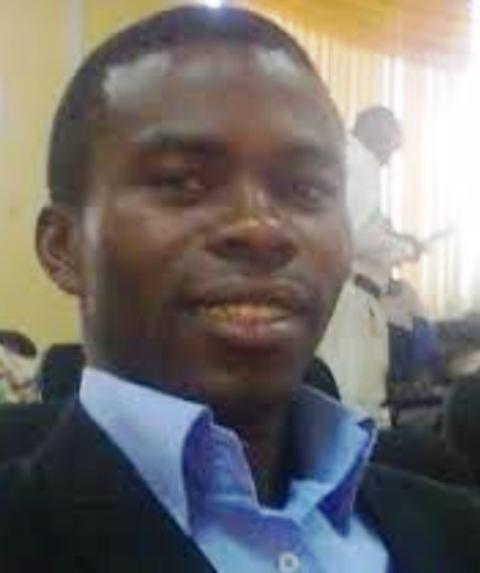
Pride of the Motherland
This poem won seventh place winner in "African's Pride" Poetry Contest in June 30, 2010.
Riding an elephant
Down the narrow trail looking triumphant
Scanning the golden landscape
Like Hannibal with enemies in flight
Sight from a lofty height
King of the jungle moving
With lioness by his side
Climbing Mount Kilimanjaro
Guides by my side with packs on their backs
Some paths steep with rocks
Boots slipping below our tired feet
Beautiful birds in unison flight
Moving with terrestrial light
Stunning sunlight summit on the peak
Praying in an Ethiopian Church
Preserved in rocks built by humans’ hands
Never touched by conquest plans
Protected from the invaders’ footsteps
Queen of Sheba and Solomon’s nest
Touched by Arch of the Covenant
Mary, Joseph, and Jesus once slept
Eating yam, sipping palm wine, and tasting milk
Freshly squeezed by experienced hands
Taste of life in the mosaic grassland
Sustaining and soul refreshing
Cradle of humankind adorning
Invaded for its gold, riches, and human capacity
Birth of life on earth with tenacity
Respecting its living and arduous journey
Essence of life once was and is again to come
Riding a camel across the hot Sahara sand
Once wet now dried, exported gold from Mali...
Treasures from the hearts of once African empires
That which was, is, and shall forever be
Africa the birthing Motherland
We still love and respect thee!
5. Alem Hailu Gebre Kristos: Welcome White Dove

Welcome White Dove
Welcome, welcome
White dove
The hatred wall
That estranged cousins
Have begun to fall
When love
Incarnated in white dove
Started to fly high
Over Ethiopian- Eritrean sky.
Welcome, welcome
White dove
You are an antidote
Border dispute to solve.
Welcome, welcome
White dove
Ethiopia's port problem
Eritrea's financial-return
Challenges
You are sure to dissolve.
Welcome, welcome
White dove
Tourism and trade
Must spur ahead.
So to wipe out
Dislike's filth
Let us put a glove.
Welcome, welcome
White dove
To make up for
Lost resources and chances
Also the two cousins
From dislike to absolve.
*Note: Ethiopia and Eritrea have finally resumed friendship after twenty years of a no-war-no-peace stalemate.
6. Mengistu Lemma: Longing
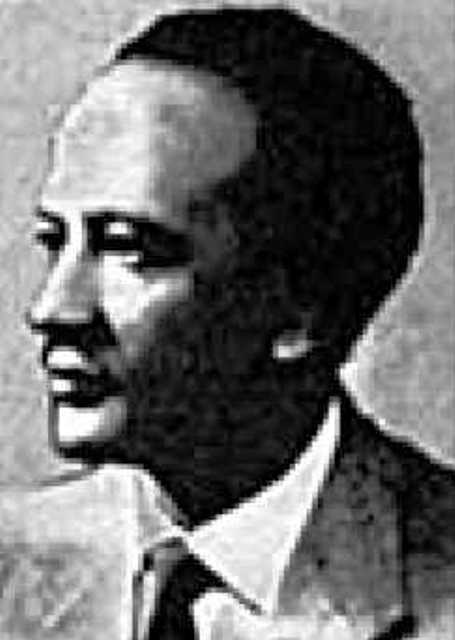
Mengistu Lemma was a poet and playwright. He was socially committed to popularizing Ethiopian indigenous culture; this is best seen in his notable work ‘Yabbatoch Ch’ewata’ (Pastimes of the Forefathers), a collection of poems.
Longing
The train hauled me out of London -
out of the smoke, the smog, the grime,
the filthy mix of soot and dust -
while the train spun fog from the fabric of steam,
clothing the land with its garment
of blessings and punishment,
Yizze kataf, yizze kataf, goes the powerful weaver.
Isn’t it amazing? Life’s a miracle:
coal smoke set free through the power of coal!
The carriage was big enough for ten,
but no-one was brave enough to open the door
I’d shut fast to keep in the warmth.
Instead, they huddled in the corridor,
unwilling to share the warmth with a black man -
even though coal is black, even though
the wealth of England was forged by black coal.
The train whistled like a washint flute;
haystacks dotted the distant fields,
just like the straw roofs of houses in a village at home.
And in the blink of an eye, I turned into
‘a traveller of God’ in the meadows of England...
‘Greetings to your household!’ I cried,
‘I am your “black”, your unexpected, guest:
your kindness to me will bring you God’s blessings’.
‘Welcome, come in!’ the head of the household replied.
Then his wife brought a bowl of warm water,
and kneeling down happily to wash my feet,
‘Don’t be shy, my friend,’ she said.
First my mouth blessed that tulla beer of Gojjam,
then a bowl arrived, and my empty stomach began to fill
as I licked the linseed oil of Gondar from my fingers;
next, chicken stew rich with curds. Contented,
I yawned. Sleep overcame me as I lay down
on fine cotton and was covered with wool...
Dimly, I heard the door slide open — but was fully awake
by the time it slammed shut. I jumped,
but then calmed myself down,
glowering at the reckless young man,
the brave one who’d dared to enter my den as I slept.
But his spotless shirt and neat matching tie
made me laugh: he was so amazingly clean!
*Note: Translated from Amharic by Martin Orwin, Sarah Maguire and the Poetry Translation Centre Workshop.
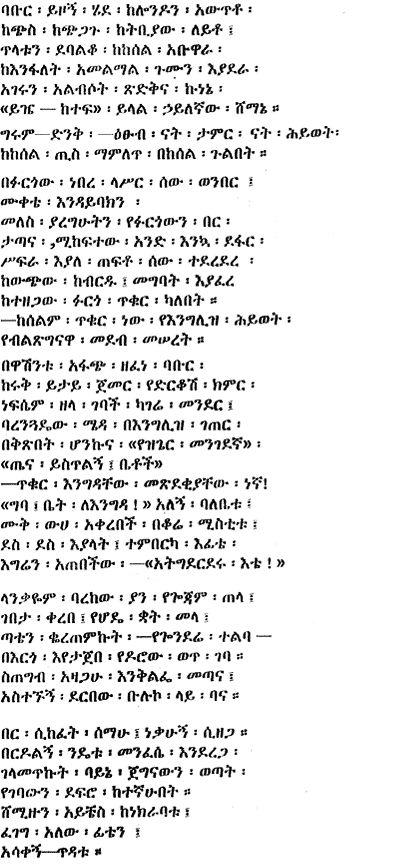
7. Gebre Kristos Desta: Solace
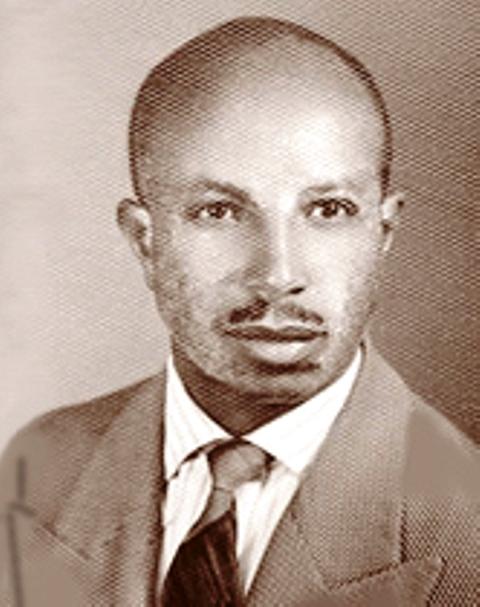
Gebre Kristos Desta, was born in Harar, Ethiopia. He was an accomplished poet, artist, and teacher. Late in life, he established himself as an independent artist in Addis Ababa, and his work was exhibited both in Ethiopia and abroad.
Solace
*Note: Translated from Amharic by Solomon Deressa.Work in progress
growing continually
whiling away the days.
A small room,
shelter from the world’s ills.
A small chair
that hugs
that braces.
Old clothes
worn out comfortably
thread-bare.
Old shoes
that have served
that have worked.
A decanter, a plate, water
water to wash in.
A towel, rough.
A stove, charcoal fire,
fire, warmth.
A crumb of bread,
milk in a bottle
fruit on a plate.
A cigarette,
half gone,
smoking.
A letter,
a note-book of memories,
a newspaper.
Kinsmen in a frame,
photo of a friend.
A bedside lamp,
on the wall shadows
a picture.
Books,
books,
books
(to lean on, to run to, to hide in)
that are company,
that teach,
that bait a dialogue.
A bed, a mattress, a pillow
a bed to sink into
repose.
Sleep,
sleep,
sleep.
Also others,
also many
many others.
Provide solace.
8. Walt Whitman: Ethiopia Saluting The Colors
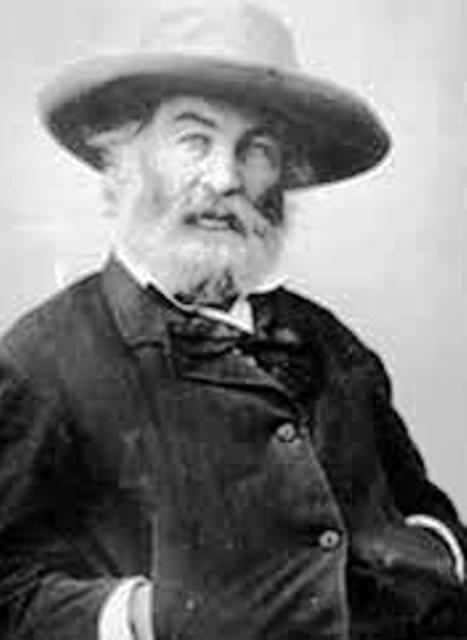
World famous poets Walt Whitman and Emily Dickinson (The Ethiop within) Walt Whitman and Emily Dickinson (The Ethiop within) both used an image of an Ethiopian in poems they authored in the 1860's.
Ethiopia Saluting The Colors
WHO are you, dusky woman, so ancient, hardly human,
With your woolly-white and turban'd head, and bare bony feet?
Why, rising by the roadside here, do you the colors greet?
('Tis while our army lines Carolina's sand and pines,
Forth from thy hovel door, thou, Ethiopia, com'st to me,
As, under doughty Sherman, I march toward the sea.)
Me, master, years a hundred, since from my parents sunder'd,
A little child, they caught me as the savage beast is caught;
Then hither me, across the sea, the cruel slaver brought.
No further does she say, but lingering all the day, 10
Her high-borne turban'd head she wags, and rolls her darkling eye,
And curtseys to the regiments, the guidons moving by.
What is it, fateful woman--so blear, hardly human?
Why wag your head, with turban bound--yellow, red and green?
Are the things so strange and marvelous, you see or have seen?
9. Alexander Pushkin: I loved you...
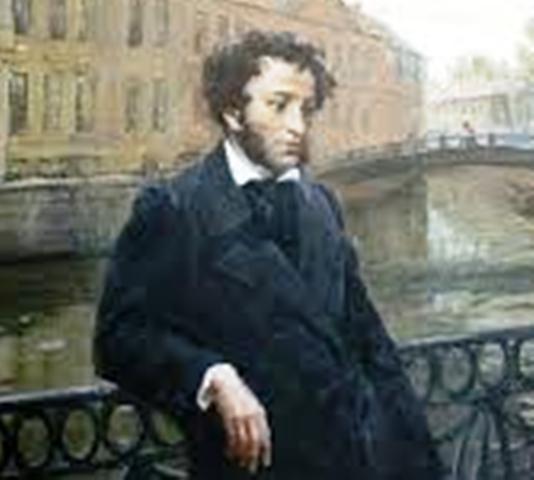
It is widely believed as fact that the great-grandfather of the greatest Russian poet Alexander Pushkin (1799 – 1837) came to St. Petersburg, according to some, from northern Ethiopia. His name was Abram Hannibal (1696 – 1781), and he was brought to St. Petersburg and at the age of 8 or 9.
I loved you...
I loved you, and I probably still do,
And for a while the feeling may remain...
But let my love no longer trouble you,
I do not wish to cause you any pain.
I loved you; and the hopelessness I knew,
The jealousy, the shyness - though in vain -
Made up a love so tender and so true
As may God grant you to be loved again.
10. Paul Laurence Dunbar: Ode To Ethiopia
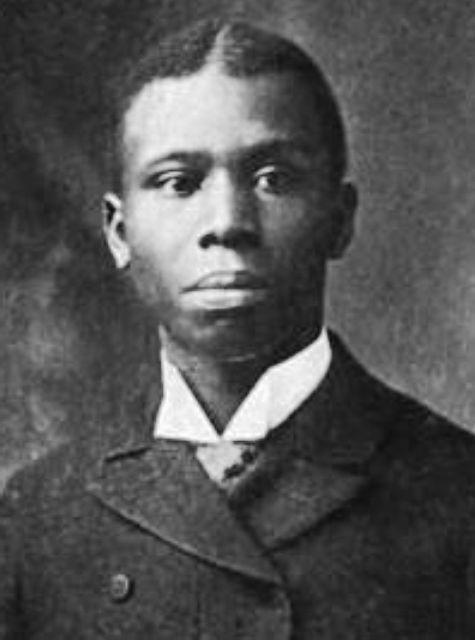
Paul Laurence Dunbar was an African American poet, playwright, and novelist in the late 19th and early 20th centuries.
Ode To Ethiopia
O Mother Race! to thee I bring
This pledge of faith unwavering,
This tribute to thy glory.
I know the pangs which thou didst feel,
When Slavery crushed thee with its heel,
With thy dear blood all gory.
Sad days were those -- ah, sad indeed!
But through the land the fruitful seed
Of better times was growing.
The plant of freedom upward sprung,
And spread its leaves so fresh and young -
Its blossoms now are blowing.
On every hand in this fair land,
proud Ethiope's swarthy children stand
Beside their fairer neighbor;
The forests flee before their stroke,
Their hammers ring, their forges smoke,
They stir in honest labour.
They tread the fields where honour calls;
Their voices sound through senate halls
In majesty and power.
To right they cling; the hymns they sing
Up to the skies in beauty ring,
And bolder grow each hour.
Be proud, my Race, in mind and soul;
Thy name is writ on Glory's scroll
In characters of fire.
High 'mid the clouds of Fame's bright sky
Thy banner's blazoned folds now fly,
And truth shall lift them higher.
Thou hast the right to noble pride,
Whose spotless robes were purified
By blood's severe baptism.
Upon thy brow the cross was laid,
And labour's painful sweat-beads made
A consecrating chrism.
No other race, or white or black,
When bound as thou wert, to the rack,
So seldom stooped to grieving;
No other race, when free again,
Forgot the past and proved them men
So noble in forgiving.
Go on and up! Our souls and eyes
Shall follow thy continuous rise;
Our ears shall list thy story
From bards who from thy root shall spring,
And proudly tune their lyres to sing
Of Ethiopia's glory.
See also:
155 of the Best Ethiopian Proverbs and Wise Sayings in Amharic and English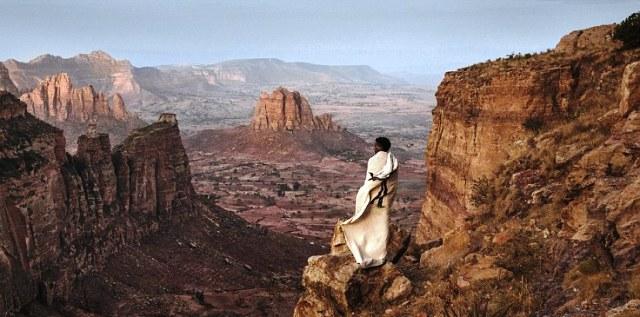
11. Alemayehu Gebrehiwot: OK, let’s be exiled!
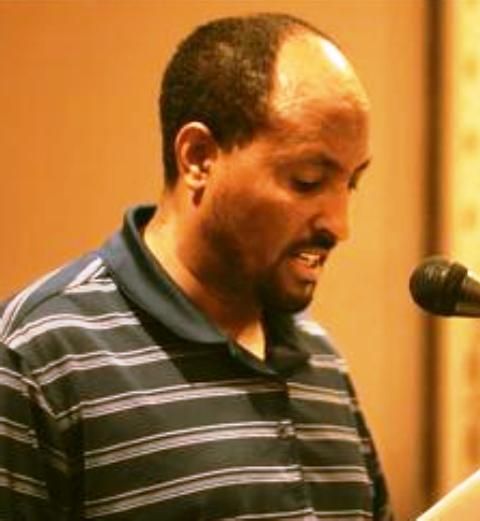
Alemayehu Gebrehiwot, born in 1962, studied drama at Addis Ababa University, then worked for the Ministry of Culture before emigrating to the US, in 2000. His Amharic translation of Oscar Wilde’s play "Lady Windermere’s Fan" was staged at the Hager Fikir Theatre in Addis Ababa. His collection of poems in Amharic, "Etalem: Sebseb Getemoch" (The Endeared Sister) was published in 2006.
OK, let’s be exiled!
Yes, let’s be exiled,
far from our families,
our beloved country,
our villages, our rivers.
Let’s go! let’s rush!
yes, let’s be exiled,
Mary did it, trudging
over the deserts
with Jesus in her arms.
Then
let’s forget refuge forever
and start thinking of going back!
Let’s build imaginary houses
for our hearts to settle in advance
and fill them with wealth and blessings,
until the cows come home.
Yes, let’s return!
Let’s never get too comfortable!
*Note: Translated from Amharic by Getatchew Haile.
12. Amha Asfaw: Silence/A Candle in a Jar
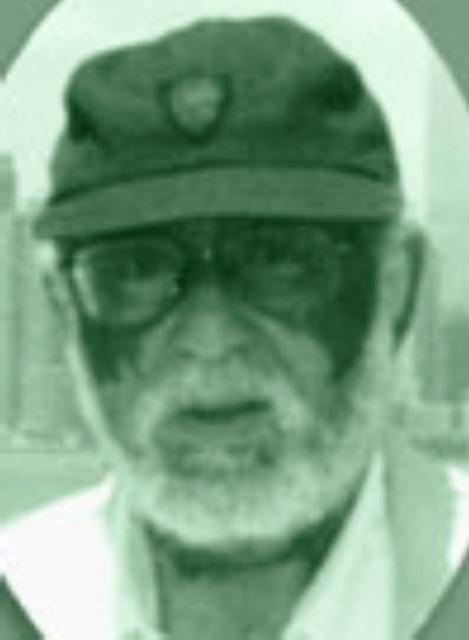
Amha Asfaw, born in 1949 and later moved to the United States in 1974. He is a physicist at the University of Missouri, Columbia. He has translated Langston Hughes poems into Amharic and his latest collection is called "Yilalla Denebo", the title of a funeral lament.
Silence
Silence is golden, say my countrymen.
A bug would not enter a closed mouth, say my countrymen.
They have not seen America,
a land where silence is synonymous with laziness
and a quiet man is considered ignorant.
A Candle in a Jar
Do not deceive yourself
that you are a candle in a jar:
a candle gives off light.
Do not deceive yourself
that you are a glowing ember:
embers burst into flame.
Do not deceive yourself
saying “we are the ashes left by a fire”:
you never burnt like a fire.
You do not have the fuel.
You do not have the oil
which is the source of all light.
You do not have it in you.
*Note: Translated from Amharic by Getatchew Haile.
13. Alemtsehay Wodajo: The Soul Has a Message
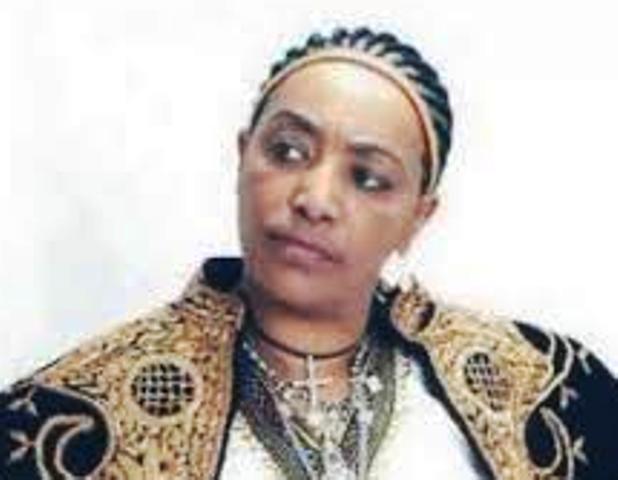
Alemtsehay Wodajo, born in 1955, is an accomplished song-writer, poet, and actress. Most of her poems are based on traditional war songs, which women sang for the purpose of inspiring soldiers in the field of battle. Two notable poetic collections of hers are ‘Marafiya Yattach Heywot’ (A life that has no resting place), published in 1996, and ‘Yemata Injera’ (Evening Bread, 2009).
The Soul Has a Message
From the time she arrives, until the time she leaves her borrowed body,
the soul has a message, a role to perform and the means to perform it:
she creates the things she likes, but also works for others
and plans for the future, spinning comforts like a thread.
The soul has a message, she is entrusted with an assignment.
There are those who are dead even while they live,
who have erred and disappointed the soul,
who have carried her without benefit and paid no attention to her,
who have passed away despised, who let their soul pass away despising her.
To the likes of these, she should not have been given.
To those who, carrying the soul, have no soul.
*Note: Translated from Amharic by Getatchew Haile.
14. Lena Bezawork Grönlund: Mercato, Addis/Addis Ababa/Close
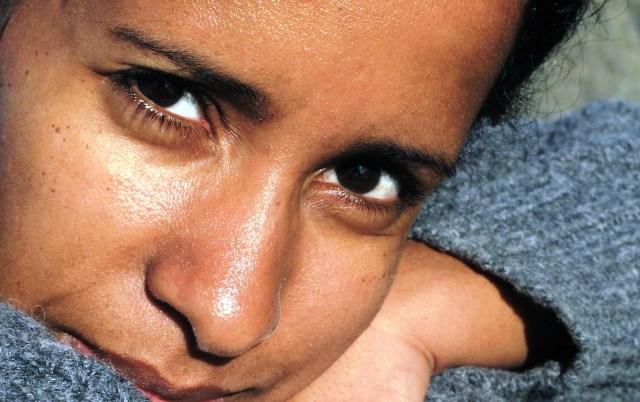
Lena Bezawork Grönlund, born in Addis Ababa but was raised in the northern part of Sweden. Lena has a master’s degree in Library and Information Science from Uppsala University and a B.A in Literature and Creative Writing from the University of Montana.
Mercato, Addis
red bicycles
blue houses
red bicycles
I dream
of blue houses
red bicycles
Addis Ababa
This city
wakes with the mosques
that begin their days
praying, closing its eyes
to the sound of drums
echoing from the churches
out into the night.
Close
Beza, this is
dust
this is
seventeen
years
of
dust
at this market
yet
everything
here
carried me
15. Alemu Tebeje Ayele: The Saucepan and the Cabbage/At the Departure of My Best Friend
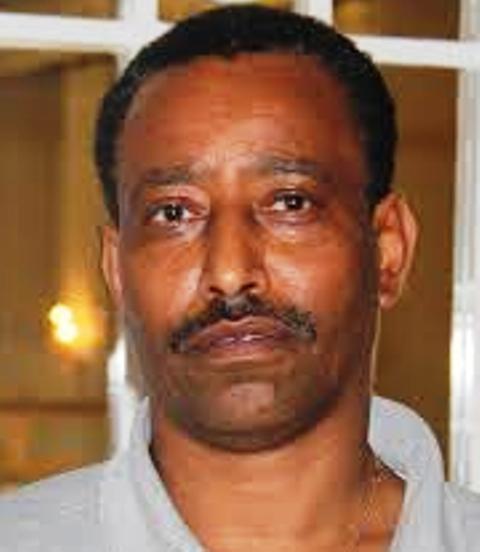
Alemu Tebeje Ayele, is a poet, journalist, social worker and internet campaigner residing in the UK. His poems were published in the anthologies ‘Forever Spoken’ and ‘No Serenity Here’, featuring twenty six poets from twelve African countries.
The Saucepan and the Cabbage
One day, the ghosts of two dictators
bump into each other in the Palace:
Mengistu: I found a cabbage
BIG as Ethiopia!
Meles: I found a saucepan
BIG as Ethiopia!
Mengistu: Well, what will you do with it?
Meles: I will cook your cabbage in it!
Our country is that saucepan
and we are the cabbage,
still cooking on the fire they lit.
At the Departure of My Best Friend
My best friend has died
and my grief is a fire that burns even my tears.
I miss his honest smile,
his goodness keeps me company.
Now the mourners walk away
and do not see me burning for my best friend.
He is far from life now,
burnt out of his life by the flames of yellow fever.
*Note: Translated from Amharic by Chris Beckett.
16. Hama Tuma: Of Guilt
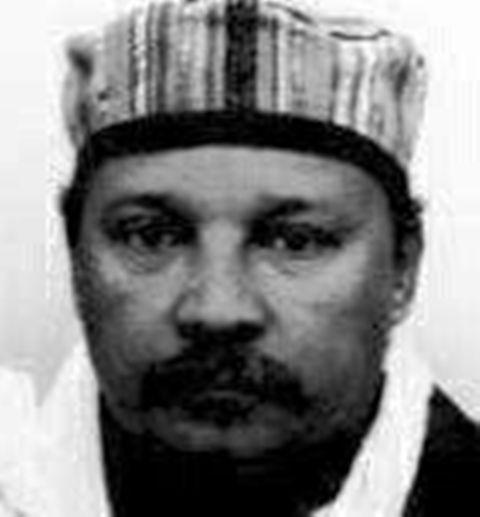
Hama Tuma, lives in Paris, France and is considered to be an influential Ethiopian political activist, as well as, a poet, and author of satirical articles/short stories. Notable of all his works are his first collections of stories: ‘The Case of the Socialist Witch Doctor and Other Stories’, which was published by Heinemann London in 1993.
Of Guilt
The man ran after his fart
to slap it back
and erase the shame.
The stink lingers.
Today’s love is tepid, almost cold,
won’t dry a hankie,
no heat at all.
Time has subdued my countrymen,
they pass history twice and
leave no shadow behind.
The frog in the pond
laughed itself to death, the owl is blind.
In the Waldiba monastery, forever silent,
noisy festivities are held.
Time moves on grinding all,
changing all,
but the crocodile has no teeth
and the Ethiopian no guilt:
everyone’s heart is lost.
17. Bewketu Seyoum: I Won’t Climb a Mountain/The Door to Freedom/Fool’s Love/In Search of Fat/Elegy/Prohibited!
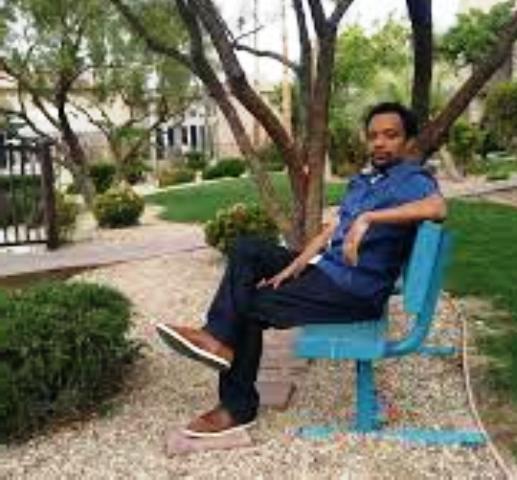
Bewketu Seyoum is a writer and poet from Mankusa in Gojjam. His father is an English teacher and his mother comes from a family of Orthodox priests. He published three collections of Amharic poetry, two novels and two CDs of short stories. Bewketu was awarded the prize for Young Writer of the Year in 2018 by the President of Ethiopia and in 2012, he was chosen to represent Ethiopia at the Poetry Parnassus festival in London.
I Won’t Climb a Mountain
I won’t climb a mountain
to touch the clouds,
I won’t lift the frown
of a rainbow into a smile,
I won’t borrow
Tekle Haymanot’s wings
or Jacob’s ladder -
when I want to climb,
the sky will come down to me!
አልወጣም ተራራ
አልወጣም ተራራ
ደመናን ልዳብስ
ቀስተ ደመናውን፣ ሽቅብ ልቀለብስ
አልዋስም እኔ
ካ’ቡነ ተክሌ ከንፍ
ከያዕቆብ መሰላል
እኔ መውጣት ሳስብ
ሰማዩ ዝቅ ይላል፡፡
The Door to Freedom
If tortured spirits
who have lived in chains
are suddenly called to freedom,
the door of their cell thrown open
and the guards sent home,
they will not feel truly free
unless they break through the wall.
ፍኖተ አርነት
ተበዳይ መናፍስት
ታፍነው የኖሩ
ወደ አርነት ዐውድ በድንገት ሲጠሩ
ያለጠባቂ ዘብ ተከፍቶ ሳል በሩ
የወጡ አይመስላቸው ቅጽሩን ካልሰበሩ
Fool’s Love
For him
she is not just a woman:
she holds the stars in her body,
the earth in her soul.
Even if he spends his life running away,
he will not get far.
ሞኝ ፍቅር
ለሱ
ሰው ብቻ አይደለችም
ጠፈር ናት ባካሏ
መሬት ናት በነፍሷ
ዕድሜ ልኩን ቢሮጥ
አያመልጥም ከሷ፡፡
In Search of Fat
A multitude of thin people, all skin,
call out like rag and bone men,
“Where’s our fat?” They rummage
every mountain, stone and huddle-huddle,
search in the soil, search in the sky.
At last they find it, piled up on one man’s belly!
ኅሰሳ ስጋ
እልፍ ከሲታዎች ቀጥነው የሞገጉ
“ስጋችን የት ሄደ?” ብለው ሲፈልጉ
በየሽንተረሩ በየጥጋጥጉ
አስሰው አስሰው በምድር በሰማይ
አገኙት ቦርጭ ሆኖ ባንድ ሰው ገላ ላይ፡፡
Elegy
The fall of every leaf diminishes me,
so when I hear a rustle
I send my eyes out of the window
to look at the trees in the yard.
Alas! where there were woods,
I see flag-poles standing.
Men have swept nature’s nest away
to build their cities.
The melody of the nightingale
has lost its immortality
and I am sitting on a dead land,
writing an elegy in the sand.
ሙሾ
ያንዲት ቅንጣት ቅጠል መውደቅ እንደሚያጎድለኝ አውቃለሁ፣
ኮሽታ በሰማሁ ቀጥር፣
ዐይኖቼን በመስኮቴ ማዶ እወረውራለሁ፣
በጉዋሮዬ ያሉትን ዛፎች ለማየት ፡፡
እነሆ ዛፎች በነበሩበት፣
የባንዲራ ምሶሶዎች በቀሉበት፡፡
ሰዎች የተፈጥሮን ጎጆ መነጠሩ፣
ከተሞቻቸውንም ሠሩ፡፡
እኔም ፣የሽመላው ማህሌት፤ ህያውነቱን ሲያጣ እያየሁ፤
በሙት ምድር ላይ ቆምያለሁ፤
ባሸዋ ብራና ላይ የሙሾ ግጥም እጽፋለሁ፡፡
Prohibited!
Smoking is prohibited!
Whistling is prohibited!
Peeing is prohibited!
The whole wall made up of prohibitions.
Which one is right??
Were I blessed with a piece of wall, a little piece of power,
my slogan would be:
Prohibitions are prohibited!
ክልክል ነው!
ማጨስ ክልክል ነው!
ማፏጨት ክልክል ነው!
መሽናት ክልክል ነው!
ግድግዳው በሙሉ ተሠርቶ በክልክል
የቱ ነው ትክክል?
ትንሽ ግድግዳ እና ትንሽ ኀይል ባይለኝ
“መከልከል ክልክል ነው!” የሚል ትእዛዝ አለኝ፡፡
*Note: The translations were done by the author in collaboration with Chris Beckett and Alemu Tebeje Ayele, except for ‘Prohibited!’, which was translated by Bahrnegash Bellete.
18. Zewdu Milikit: Year of the Spider/The Few/Ripe and Raw/The Fashion of Silence/Wood’s Story
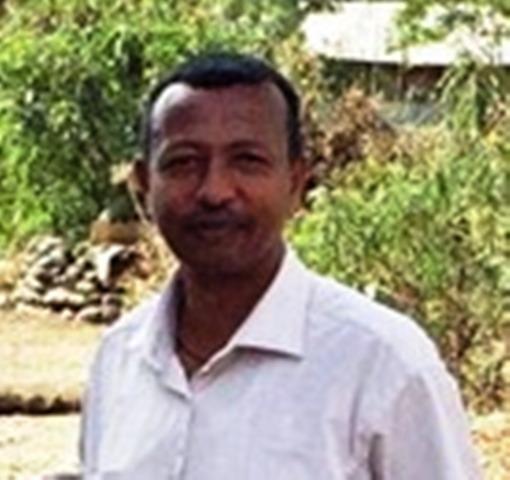
Zewdu Milikit, born in 1958 on the shores of Lake Tana in Bahir Dar, Ethiopia, studied languages in Addis Ababa University and is now a lecturer at Gondar College of Teacher’s Education.
Year of the Spider
Animals symbolised years
since the olden days,
but animals are old hat now,
insects are the way to go
in the year of the spider -
everyone’s weaving a ladder
of cobwebs, and trying
to fly when they’re falling.
የሸረሪት ዘመን
አየተመሰለ በእንስላት ዘመኑ፣
ብዙ ዓመት ታልፎ ነው የደረስን ካሁኑ፡፡
አለፈበትና ምስለት እንስሳቱ፣
ቀስ አያልን ደረስን ከምስለ ነፍሳቱ፡፡
ሆኖ የሸረሪት ምስለት ዘመኑ፣
ሰዎቹ በሙሉ በማድራት ተካኑ፡፡
አድርተው አድርተው አንዴ እንደሞከሩ፣
እንደሸረሪቱ ሸረር ብለው ቀሩ፡፡
The Few
Who in their hunger find a sort of bread,
joy even in what they dread,
a maybe in never.
Who, being few, do not envy others
and whose works, like brothers
you can count on one hand, count forever.
የአለም ጥቂት ሰዎች
ርሃብ ጥጋባቸው፣
ደስታ ሃዘናቸው፣
ፍቅር ጥላቻቸው፣
ሁሉም ጥቂት ሆኖ በጥቂት ያልቅና፣
ጥቂት ስራቸው ግን ቢሰፈር አያልቅም በዘመናት ቁና፡፡
Ripe and Raw
Something ripe and something raw,
when cooked together, go to war.
But that’s not all, there’s more:
as raw gets ripe, the ripe burns down,
so ripe might just as well be raw!
Mix your feelings up together
and however fast you stir and stir,
the fresh ones turn out nice and brown,
but older passions end up sticking to the pan.
ብስልና ጥሬ
ብስልና ጥሬ ባንድ እየተቆሉ፣
ሁሉም ክስል ያሉ የጨሱ መሰሉ፣
ሰካስ እንዲያ አይደለም ወዲህ ነው ምስጢሩ፣
ጥሬው እስኪበስል ብስሉ ነው ማረሩ::
ደግሞ እንዲሀም አለ ብስልም ጥሬ መምሰል፣
አብሮ እየተቆሉ
እስኪያሩ መማሰል … መማሰል … መማሰል …
መማሰል ሲበዛ ጥሬው በሰለና፣
ብስሉ አራራ ሆኖ ምጣድ ላይ ቀረና::
The Fashion of Silence
He used to let his beard
grow long
and never comb his hair.
“Little’s all I need”, he’d say,
his pants as thin as hermits
under an itchy coat.
He loved a fierce discussion
for the sake of it,
the rip of one opinion
being torn
from all the talk around.
But that’s long gone:
today his hair
is short and smartly
trimmed, his handsome
new persona boasts
a wardrobe of fine clothes:
shirt and t-shirt combos!
jackets and their matching ties!
tailored trousers
loose enough to bag
a thousand private thoughts -
such quiet quality,
whispery as a woman’s dress,
whispery as him.
The temper of the times
has changed,
no talk of so, so many things,
no fierce discussion,
clashing views -
today the House of Learning
wears a fashionable hush.
የዝምታ ፋሽን
ጺሙን አጎፍሮ፣
ፀጉሩን አንጨፍሮ፣
ዓለም በቃኝ ያለ፣
መናኝ የመሰለ፣
ሱሪውን አጥብቆ
“በሳሪያ” ኮት ታንቆ፣
ማውራት መነጋገር፣
ብዙ ብዙ ነገር፣
በጥብቅ መወያየት፣
መፋጨት መጋጨት፣
በሃሳብ መናጨት፣
እንዲህ ነበር ድሮ፣
ዛረ ተቀየሮ፣
ፀጉር ባጭር ባጭር፣
ከርከሙ የሚያምር፣
መልከን የሚያላምር፡፡
የላይ ልብስ መብዛ፣
“ሸሚዙ ቲ ሸርቱ፣
“ኮቱና ጃኬቱ::”
ሱሪው ያልጠበቀ ሰፊ የሚያዝናና፣
ሽፍኖ የሚይዝ የራሰን ገመና::
አይ ሱሪው ስፋቱ!
እቤት ደስ ማለቱ፣
ጥሩ ቀሚስ መስሏል ምትለብስውን እቱ::
ደግሞኮ ፀጥ ነው፣
ፀባይ ልዩ ነው::
ማውራት መነጋገር፣
ብዙ ብዙ ነገር፣
በጥብቅ መወያየት፣
በሃሳብ መጋጨት፡
ያያ ዛሬ ቀርቷል፣
የዝምታ ፋሸን “ከምሁር” ቤት ገብቷል::
Wood’s Story
Wood burned and heated Metal.
Metal melted into Axe
and cut down a whole family of Trees.
But when the mother of all Trees
cried out for justice,
Axe felled another forest,
and Wood fell for his own tricks,
by changing his name to Handle.
የእንጨት ነገር
እንጨት ነደደና ብረትን አጋላ፣
ብረትም ጋለና አይሆኑውም ሆነ፡፡
ብረት ተቀጥቅጦ ምሳር ሊወጣው፣
የእንጨትን ዘር ሁሉ ቆራርጦ ጣለው፣
ምሳር ቂም ሊወጣ ሲቆርጥ እንጨትን፣
እንጨት አጋዥ ሆነ ቀይሮ ስሙን፣
ራሱን አታሎ ራሱን ሸንግሎ፣
ራሱን ቆረጠ እጀታ ነኝ ብሎ፡፡
*Note: Translated from Amharic by Chris Beckett and Alemu Tebeje Ayele.
19. Liyou Libsekal: Riding Chinese Machines/Momentum Lives in the Foothills/Childhood was Mud-Play and Dirty Fingernails/Agar/Sorry, We Are Busy Growing/Regrets as Long as Fishing Lines
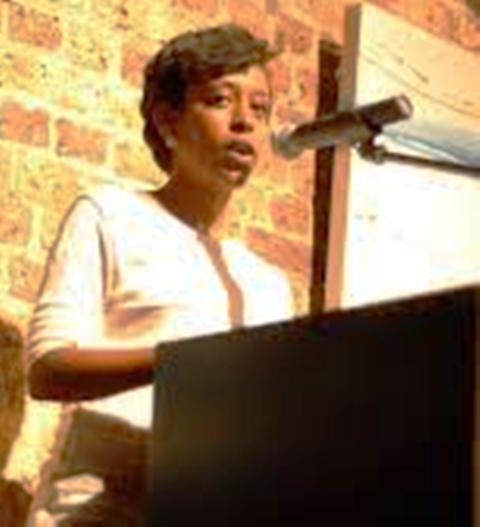
Liyou Libsekal,, born in 1990, grew up in several countries of East Africa. She moved to the US and received her BA in Anthropology in 2012 from George Washington University. After a brief stay in Vietnam, she returned to her homeland of Ethiopia and in 2013 began writing about culture and the environment for Ethiopian Business Review. She received the Brunel University African Poetry Prize in 2014.
Riding Chinese Machines
There are beasts in this city
they creak and they crank
and groan from first dawn
when their African-tongued masters wake
to guide them lax and human-handed
through the late rush
when they‘re handled down and un-animated
still as we sleep, towering or bowing
always heavy
we pour cement through the cities
towns, through the wild
onwards, outwards
like fingers of eager hands
stretched across the earth
dug in
the lions investigate
and buried marvel rumbles
squeezed for progress
Momentum Lives in the Foothills
here, the mountains sit heavy while their children buzz
under, around and in between them
ambitious, soles in cycles
feet snug in cement-dusted leather
we build and the air smells of movement
of hope-soaked bodies and chemical dirt
we watch creaking teeth smash concrete
unaffected operators; friends at their feet
they move through creatures
missing shirking heads and quick limbs
Childhood was Mud-Play and Dirty Fingernails
I was born to a woman whose hands are washed with ritual
balancing act
temperatures and tempers
home grown versus raised afar,
cleansing finales
this, always with translucent crowns on blushing fingertips
I thought her magic lay in age-
in mine,
the earthworms slipped beneath the dirt unsexed and unbothered
simply hydrated to form
and the heart-red soil had to follow suit
under muted hose and desperate hands
Agar
I remember a yellow scarf fashioned every which way
and beautiful bones that peaked at the cheeks. Mounted proud
“young mother” in eyes mourning a daughter left behind
Families don’t speak of shame
and hindsight lives in layers.
She was pieces of you strolling tall, slender and curved
but you were with me as she cocooned and rolled and stretched.
Always in a flowered dress, always drenched in fate
you sit, a lakeside lullaby
a picture of youth then, and forever and forever
I gnaw on whether you knew near the end
but with age as authority, we lived in darkness
why expect more in death?
My anger lives in layers
un-abandoned, if only for my sake.
Sorry, We Are Busy Growing
Before I left the neighborhood, the city and so on, our mad man was simply a boy. Settled in thoughts until he had to chase taunting children from his lost mother’s door; until he found himself in dust-covered green, keeping time with short sharp steps and an extra arm. Sixteen years and his rambles announce his arrival. His steps still sure on our still rubbled paths, parted quick of boisterous kids who run to whisper behind the skirts of busy women or the makeshift seats of idle men. And all watch like the shabby dog who guards his weathered sleeping spot, eyes speckled with suspicion Our mad man’s words are strung without beginning or end, missed by blocked ears hot with fear of the glazed look that sits on a body born to hurt, on a face that betrays the dearth of a nation concerned only with numbers.
Regrets as Long as Fishing Lines
I dreamt we were made of sand
trickled from the mouth of a catfish
(and I remembered pulling two out of Langano)
when this mother was done spilling us into form,
she coughed up a coil of bronze
and sunk it into each of our foreheads
then, beginning from her whiskers
she cracked into a pile of sheer shells
so I carried them nestled in my hair
to the edge of a shoreline
wanting to bless her with rest
but her pieces had melted in the sun
leaving my strands soaked in liquid gray
20. Fekade Azeze: Addis Ababa
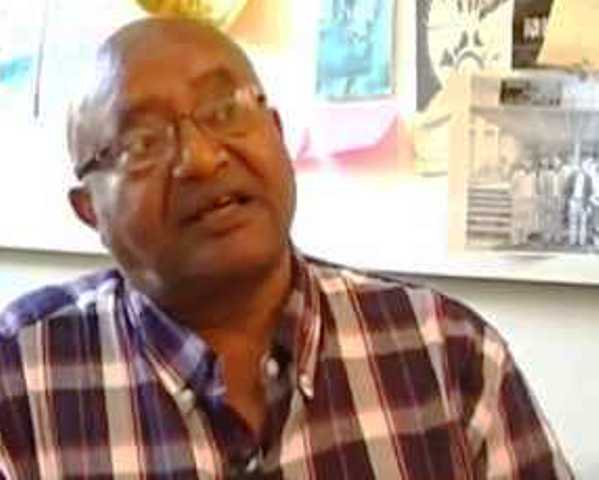
Born in 1950, he attended Addis Ababa University and later, Sheffield. Fekade has had 5 collections of poems published in Amharic, a book on famine poetry, 2 books on folklore and numerous articles about Ethiopian literature. He is currently an associate professor of Ethiopian literature and folklore in Addis Ababa University.
Addis Ababa
I walk your streets, but make no strides:
your shops and kiosks crowd my eyes
ENTs and dentistries
music stalls
drug shacks
photo booths
jumbled!
chaotic!
so many loud bars competing to make the most noise
how can so much thunder come
out of shops as small
and cluttered as gravestones?
this flow of people that never stops
pushing, storming, elbowing
measuring the chaos of your streets…
I walk your streets, but make no strides:
dinginess and squalor
poor rag-dirty men
all men, sleeping rough
in your abundant filth
on every corner
keep piercing my eyes,
I stop and glance, not long enough to see
if they are alive,
I march forward, like everyone else
we all march forward.
I walk your streets, but make no strides:
your population is so dense
there is no space to walk!
your bodies look so pale and shrunken
discoloured!
slack!
I ask myself, do they have food?
do they have a roof over their heads?
is everyone sleeping rough on street corners
lying in make-shift tukuls?
piled on top of each other like planks?
I walk your streets, making no strides,
hands stretch out and hold me back, begging every step:
thousands of fathers and mothers!
hundreds of babies and young girls!
crowds of skinny old men and teenagers
with no one to care for them
all searching for scraps, a living out of scraps.
I walk your streets, making no strides:
a naked boy runs past me
another clutches a stone or stick
others a flower or a rag
or a paper
long black hair locked in dreads
skin burnt to charcoal
shouting in the squares where other people call them
insane!
but there is always some truth in what they say
they have nobody to care for them
but they are your decorations, Addis, your beautiful jewels!
I walk your streets, but make no strides:
how can I avoid playing football with your children?
your streets are a playground
a nursery where you bring up your young
your little shoe-shine boys
lottery-ticket hawkers and cigarette touts
q’olo corn sellers, gum sellers, paperboys
children doing nothing
children begging
look! it is World Childrens’ Day
they are performing a show for everyone to see
about survival
they have made your streets into a stage.
Yes, I have walked your streets, I have made no strides.
Your secrets are endless, Addis! I will give in now, I will rest.
*Note: Translated from Amharic by the author, in collaboration with Chris Beckett.
Up-and-Coming Young Poets
21. Tefera BGZ Tefera (from his new Poetry book - HIGHle QAL
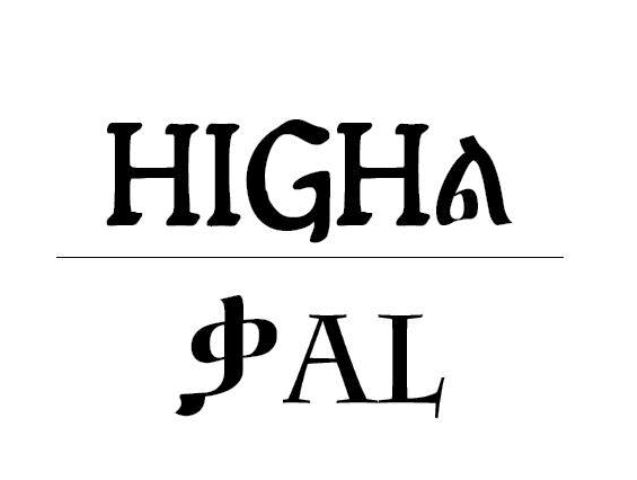
Desert Omens
Will we go down in history fighting for our rights?
When will be the day that the fighting stops
when our lenses dilate at night?
no digits ticking time pretend.
sand hour watch. can't read a clock.
Nabta monolithic rock. desert omens.
can't count them numbers. but u wanna change the scene
controlled by a web of contortion.
the matrix, backward thinking...
Learn the fundamentals first, seek wisdom
like Solomon the mason
like the Ka-mite religion
like the Lasta lost kingdom
but them dark thoughts got me wilin
mad stylin
Black ninja
Sholin
Black magic
architectural semantics
defending righteous conscious status
the real Black Israelites. i'm Wu clanin.
*Note: From the book HIGHle QAL
Riddle of the Sphinx
Got me thinking like the book of thieves
You know I never stay I always leave.
only to find out they all deceitful.
The author of my novel stay stoned like cobble
floating in space like the earth on its wobble.
Words flow through me when I switch to my channel
Aqueducts in my mind, the Red Sea canal.
Walking on water with words
confused by the lies I observe.
*Note: From the book HIGHle QAL
Wise dome
Wish I had a penny for every-time niggas said I was wise.
Staring at the top of the pyramid searching for my
survival kit how imma survive...
Lyrical deitylet my words b the end of me
no formula for my thoughts
the plan is beyond infinity
finding peace in creation ever-lasting
searching for the story that never ends
but flies passed me
lost understanding what's understoodwhile star gazing politicians scheme from the top
niggas fling hoop dream shots from the hood
how can I define strugglewhen a child is born in a battle field
losing time when everything is hidden in plain sight
clear
Can't blame a kid born in slavery coz all he know is braveryworld full of jealousy
food chain designed strangely
mortal kombat animality
for babylon shall fall
and my people stand tall
standing tall from the east
while the rest losing breath deceased.
dead man walking with-out the judge hitting tha gavelno time for this man koz the crime don't fit
36 chamber grave pit
for love will take me where I belong to be
the Sun of man u can't take nothing from me.
*Note: From the book HIGHle QAL
Extra: An Assortment of Q’ene/Qine/Kine Ethiopian Poetry
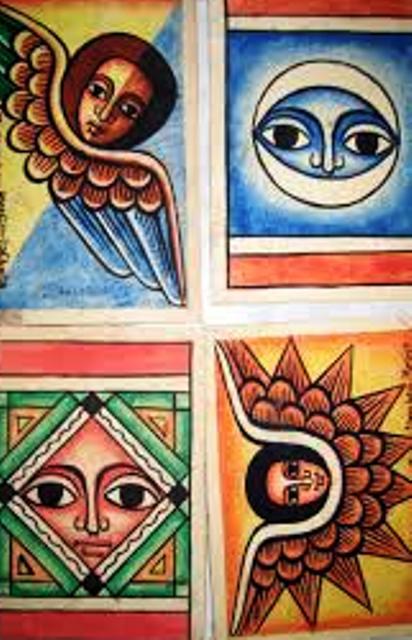
‘We do not respect an angel for his wings…’
We do not respect an angel for his wings
or because he covers his face with his wings.
After all, birds and insects have wings.
We do not respect an old man for his white hair.
After all, wood may turn white in cold air.
We respect a man for his wisdom, not his white hair.
Liqoo Kefle Yohannes, translated by Chris Beckett.
‘One teacher bows to another…’
One teacher bows to another.
Finger and thumb are unequal brothers.
Author unknown, it is an ancient Gondar "Gubae Cana”, translation done by Chris Beckett.
‘Mount Tabor’
Mount Tabor, though it could make men quake,
could not explain God’s secrets.
But the cloud, so insubstantial, spoke.
Author unknown, it is a Zeamlakye Q’ene from a Gondar scholar, translation done by Chris Beckett.
‘Since Adam…’
Since Adam/your lip did eat of that Tree,
The Saviour/my heart has been hung up for Thee.
Author unknown, it is a "sem ena work" (wax and gold) q’ene where 2 subjects are placed side by side and the second line puns on the verb, "tasaqala", which can mean "is crucified" or "is anxious to be near". This poem is deals with Christ atoning for the sin of man, but its second meaning is that of a sensual love poem. The translation was done by Donald Levine.
‘What use is tella? What use is tejj?’’
What use is tella? What use is tejj?
When you see the enemy, serve him coffee!
Author unknown, Tella is a form of watered down beer, while tejj is a much more stronger wine made of honey. This is a "merimer q’ene" which plays on 2 meanings of a phrase, in this case "buna adargaw" (give him coffee) and bun adargaw (burn him to ashes), so the "work" (gold) of the second line is: When you see the enemy, burn him to ashes! The translation was done by Donald Levine. reference: themissingslate
